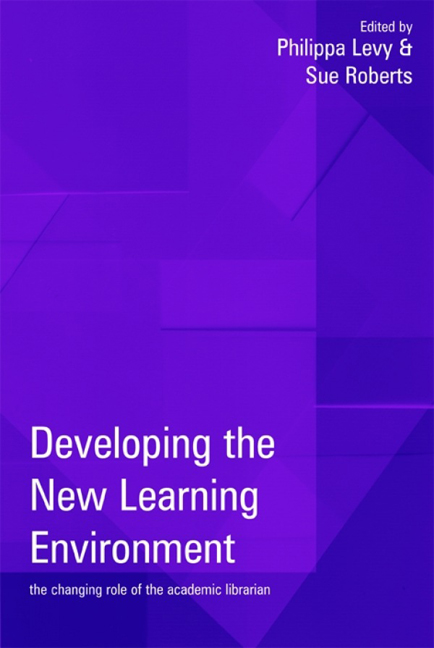Book contents
- Frontmatter
- Contents
- The editors and contributors
- Introduction: the challenge for the academic librarian
- Part 1 Perspectives on the policy framework
- 1 The policy framework: a critical review
- 2 Pedagogy in a changing environment
- 3 Literacies and learning
- 4 Key issues in the design and delivery of technology-enhanced learning
- 5 New professional identities and practices for learner support
- Part 2 Policy into practice
- Part 3 Reflections
- Index
1 - The policy framework: a critical review
from Part 1 - Perspectives on the policy framework
Published online by Cambridge University Press: 08 June 2018
- Frontmatter
- Contents
- The editors and contributors
- Introduction: the challenge for the academic librarian
- Part 1 Perspectives on the policy framework
- 1 The policy framework: a critical review
- 2 Pedagogy in a changing environment
- 3 Literacies and learning
- 4 Key issues in the design and delivery of technology-enhanced learning
- 5 New professional identities and practices for learner support
- Part 2 Policy into practice
- Part 3 Reflections
- Index
Summary
Peter Brophy sets the scene for the book, by examining the purposes and policy drivers of higher education in the changing environment. While the focus here is mainly on the UK, developments are set in the broader context of international trends. First, the history of the university sector in the UK is traced briefly from its beginnings to the changes currently in train as a consequence of the Higher Education Act 2004; the author observes along the way the recent dislodging of the principle of equality of opportunity as the key policy driver for expansion of the sector by considerations relating to higher education's role in the national economy. The chapter then moves on to consider current issues affecting institutional strategies and professional practice. It is argued that a particularly important issue for librarians in the context of learning and teaching excellence is the need to ensure that their role in this arena is fully recognized and developed, including through appropriate collaborations with other professionals; likewise, the need to embed direct access to information resources into elearning environments. Ending with a brief review of factors that contribute to a scenario of continuous change for the academic librarian, the chapter flags up a number of themes that are discussed in more detail in later chapters of the book.
Introduction
The university, in the form in which it can be observed in Britain or elsewhere in the developed world, is a relatively modern construct. Of course, institutions bearing the title ‘university’ have been in existence for many centuries – most observers date their foundation to the end of the 12th century – but the 21st century variant has only a limited amount in common with its forebears. Not only is the scale of the enterprise entirely different, but its relationship to society and underlying purpose have changed markedly. The curriculum has changed out of all recognition. Perkin (1984) has remarked that the medieval universities, in addition to being small in size and few in number, offered an undergraduate curriculum consisting of what were then recognized as the liberal arts (grammar, logic, rhetoric, arithmetic, geometry, astronomy and music) and postgraduate studies which consisted of a fusion of what were later to become the major professional disciplines of theology, law and medicine.
- Type
- Chapter
- Information
- Developing the New Learning EnvironmentThe changing role of the academic librarian, pp. 1 - 23Publisher: FacetPrint publication year: 2005



